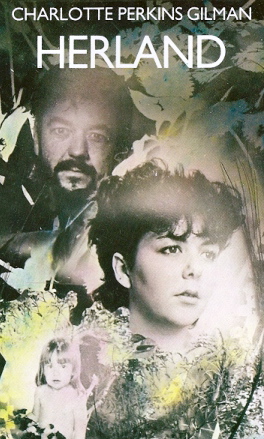Books for budding feminists: Charlotte Perkins Gilman, Herland
 So far on my journey to become a better feminist through reading I have encountered some real gems. Living dolls, the Vagina Monologues and the Beauty Myth have all opened my eyes to aspects of life that have always been there, but have also always escaped my understanding. However, after happily and hungrily digesting the first feminist fiction novel I’d ever heard about a couple of weeks ago, I now realise that I’ve been neglecting an equally valuable source of information.
So far on my journey to become a better feminist through reading I have encountered some real gems. Living dolls, the Vagina Monologues and the Beauty Myth have all opened my eyes to aspects of life that have always been there, but have also always escaped my understanding. However, after happily and hungrily digesting the first feminist fiction novel I’d ever heard about a couple of weeks ago, I now realise that I’ve been neglecting an equally valuable source of information.
I honestly didn’t think that fiction novels would teach me as much as their non-fiction counterparts would. Turns out that I was completely wrong of course. After reading The Left Hand of Darkness by Ursula K. Le Guin and now after reading Herland by Charlotte Perkins Gilman, I know without a doubt that I want to read more feminist fiction and I want to read it now!
In a way that non-fiction simply can’t, feminist fiction novels make their lessons suspenseful, thrilling, heart breaking and fun. There is so much more life in these fictional tales and best of all there seem to be plenty of lessons thrown in as well. Sure, they’re lurking in the corners a little bit or they take more conscious thought to understand, but in a way that only forces us to truly think about the concept – definitely not a bad thing.
Herland is about three male explorers who discover a hidden female society completely cut off from the rest of the world somewhere in South America. The society that they find has no males – much to their astonishment – and runs with almost perfect harmony. The amount of food made matches precisely the amount of people to feed, the buildings and towns are designed and built in a logical pattern and everything is tidy and clean.
The men are astounded as they learn more about how the community of around 2 million people operates, however what confuses them the most are the women. The men immediately view them as both unfeminine and unnatural. Their inner confidence, strength and will are not what the men of earth are used to and they don’t quite know how to deal with it. The women in Herland do everything men on earth would normally do but somehow they do it better. Theirs is a country with no disease, no war, no domination and seemingly no conflict. As the men stay longer it is amusing to see how they react to the various inconsistencies they find and also scary as their attitudes and reactions are so instantly recognizable in modern day men, despite the book being written in 1916.
While fictional, the book raises a lot of issues surrounding our gendered society as well as questioning some bigger problems concerning why our population has turned out this way. Why have we not solved the issue of world hunger when we certainly have the means? Why do we allow so many crops of food to go to waste? Why do we continue to get married in a tradition that is positively archaic? Why are women still so reliant on men? Why do we educate children in schools when a better outcome could be achieved in a way that is more enjoyable to all?
I know I just threw a lot of questions at you but this is what the book is like, in a way. This book will get you thinking and it will challenge parts of your life that you have accepted since the day you were born.
It is an engaging read and Gilman’s brilliantly evocative prose will have you racing towards the final page. Her descriptions are vivid and the speech of the characters so life like that in places I forgot that I was only reading a book and not the notes of an explorer recently returned from an exciting mission. Even though it was fictional it got me questioning the way our society works and why. It was 124 pages of fictional delight and like so many of the books I am stumbling across – I highly recommend it!
*It was with great delight that I discovered that there is not only a sequel (Her in Ourland) but also a prequel (Moving the Mountain) to this novel – that’s right folks; it’s part of a trilogy! Click here to buy all three from Book Depository.

